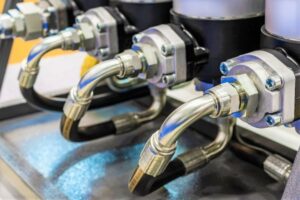
In the realm of industrial operations, the smooth functioning of hydraulic equipment is not just a necessity but a cornerstone of efficiency and productivity. The intricate workings of hydraulic systems demand a level of expertise that transcends mere maintenance. This is where the undeniable importance of hiring an expert to maintain your hydrauliequipment comes into play.
From backyard log splitters to the huge machinery you see on construction sites, hydraulic equipment is used for a wide range of tasks. Often, it is essential for safety and efficiency in a work place.
Expertise is defined as “having knowledge and skill in a particular field.” It’s not the same as experience, however.
The Complexity of Hydraulic Systems
Hydraulic systems are more complex than pneumatic ones and require more maintenance over time. They also use oil, which can be corrosive and requires extra safety precautions. This means that there’s a higher risk of leaks, which can lead to contamination from burst pipes or spilled hydraulic fluid.
In addition, hydraulic systems often require more electrical components to operate than pneumatic ones. This can increase the overall cost of the system over time.
Incompatibility between different parts, improper installation and usage, and lack of proper maintenance are some of the most common causes of hydraulic system damage. To avoid these issues, it’s important to regularly review maintenance procedures and double-check specifications to make sure that the right equipment can work together seamlessly. This includes checking the oil levels, hoses, and connections to ensure they’re not leaking or damaged and listening for abnormal sounds that may indicate impending failure. This daily task helps prevent costly repairs and extends the life of your hydraulic equipment.
The Benefits
Using an expert maintenance provider is not only good for equipment longevity but it also saves your money. It reduces downtime and the risk of costly repairs by catching problems in their early stages before they expand into bigger issues. This is possible because local repair technicians have more routine maintenance checkups, so they can spot a small problem and fix it before it becomes worse.
Contract experts offer a broader range of expertise than in-house teams. They are accustomed to working across multiple industries and can provide valuable insight and creative approaches that may not be readily available in-house.
Moreover, contract experts can perform cost analysis studies that identify opportunities to improve the efficiency of your maintenance program. For instance, they can use Failure Mode and Effects Analysis (FMEA) to examine assets, processes, or designs to identify ways that maintenance tasks can be improved. They can then recommend changes that can be implemented to decrease the chances of unscheduled downtime.
How to Choose the Right Expert
Today’s sophisticated heavy equipment relies on well-functioning hydraulics to dig, lift and mobilize. However, those hydraulic systems can fail quickly and cost you time and money in the form of repairs, replacements, and lost productivity. Preventative maintenance is the key to maximizing your machinery’s uptime and reliability.
When it comes to hydraulic equipment maintenance, experience matters. Look for experts who have a proven track record in working with a diverse range of hydraulic systems. An experienced professional brings an in-depth understanding of the intricacies and nuances of hydraulic machinery. Their expertise allows them to quickly diagnose issues, recommend appropriate solutions, and perform maintenance tasks with precision.
Reputation and References
Reputation speaks volumes about the quality of service an expert provides. Seek out reviews, testimonials, and references from previous clients. A reputable expert will have a history of satisfied customers who can vouch for their expertise, professionalism, and commitment to excellence.
Certifications and Training
Certifications and ongoing training are indicators of an expert’s dedication to continuous improvement. Look for professionals who hold relevant certifications in hydraulic equipment maintenance. These certifications often reflect a commitment to adhering to industry standards and best practices.
Equipment Knowledge
An expert should have an in-depth understanding of the specific hydraulic equipment you have in your facility. They should be familiar with the manufacturer’s guidelines, specifications, and recommended maintenance routines for your equipment.
Cost-Efficiency
While expertise comes at a price, it’s essential to find an expert whose services align with your budget. Consider the value they bring to your operations in terms of reduced downtime, extended equipment life, and improved efficiency.
Comments are closed.